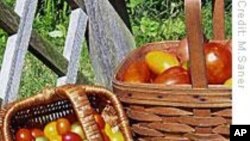On a grassy hill in Chestertown, Maryland near the Chesapeake Bay, Dolly Baker slowly pulls ripened figs off a tree. She was a marine biologist and botanical illustrator before she switched careers in 2000. "The millennium was a year to change and I chucked it and 'bought the farm,' as they say," she says with a laugh.
A link to agriculture and the land
Baker's farm is an historic white brick house surrounded by 3.5 hectares of fertile land. White House Farm was once in her family; it was built by her ancestors in 1721. Originally a dairy and grain farm, it reportedly played a role in the Revolutionary War, supplying General George Washington with grain from its three mills, while the colonial army waited out a bitter cold winter in Valley Forge, Pennsylvania, some 160 kilometers north.
White House Farm is now listed on the National Register of Historic Places, and Baker runs it as an organic farm. It's been hard work, she says, especially abiding by the strict rules for government certification as organic.
USDA organic certification is a stringent process
It takes three years for a farm to be certified. During that transition, Baker explains, farmers may not apply chemicals of any kind to the soil. "You have to use natural fertilizers. And there's a fee every year which goes towards the [government] inspections. We have to save receipts, we have to have logs of what we do [even] compost. Anything we do to keep ourselves organic, we have to document. And once a year, you're inspected, and hopefully, you pass," she says.
Baker's hard work earned White House Farm organic certification, a distinction shared with about 10,000 other U.S. farms. It's a responsibility organic farmers take seriously, Baker says. "A lot of people can grow their own organic version of produce, but it's not inspected, so people can say 'We grow all natural - this and that and the other.' They can say pretty much anything they want because nobody's checking on them," she says.
Scientist turned farmer grows produce, raises poultry
Baker, who says she once worried about eating fruits and vegetables with chemicals on them, grows over 100 varieties of organic tomatoes; she also collects heirloom tomato seeds. She grows peppers, asparagus, onions, rhubarb and table grapes.
She raises chickens, sells eggs, and owns a lot of turkeys, including a rare breed called the Black Spanish Turkey. But she plans to cut back on her turkey flock, "because the beasts are big, and they're always knocking me down in the mud!"
Digging in, she learns from the land
Baker hadn't lived on a farm before moving here in 2000. "I'm really not a farmer," she admits, adding that her previous experience as a biologist and an illustrator hasn't helped her much with her new career.
"What you learn in the classroom, unless you're in agriculture or something, just doesn't begin to cover things like predators and bugs, and the realities of 'Well, we hatched all these baby chickens, but the black snake ate 10 of them.' Between hawks and foxes, it certainly cuts into your income, but you learn to live with them, or deal with them," she says.
Baker works dawn to dusk on her farm, and says she has no regrets about her dramatic career change. "I think that this suits me," she says. "Being a person interested in history and genealogy, being able to buy back a family farm that had been in the family for 300 years is probably every genealogist's dream." She thinks for a moment, then adds with a laugh, "and it goes along with raising the antique birds and antique tomatoes."
Dolly Baker is now spending more time pruning and weeding her vineyard. Though there aren't enough ripened organic wine grapes yet to harvest, she hopes have a crop next year to sell commercially.






